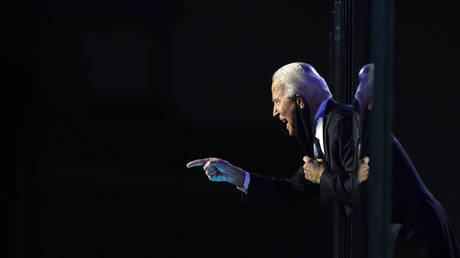Biden's Final Risk: Is Washington Attempting to Initiate World War III?
As the outgoing US president appears intent on making one last dramatic statement before leaving office, the responsibility falls to Moscow to maintain a composed stance.. source:TROIB RTS

America’s political landscape is perpetually in flux, and the current situation is characterized by a stark competition over who can leave the presidency as the biggest sore loser. Following the 2020 election defeat, Donald Trump and his supporters incessantly lamented about electoral fraud. The culmination of their grievances was the January 2021 assault on the Capitol, an event that some interpret as a tantrum of historic magnitude—akin to the Boston Tea Party, but featuring very, very exhausted toddlers.
Now, as Trump makes his return, even the New York Times has recognized him as a “transformational force” rather than a mere anomaly. This shift has prompted the outgoing Biden administration to respond with an even more dramatic display of frustration. While the Trump loyalists of 2021 staged a cringe-worthy spectacle at home, the Biden team of 2024, in a hallmark of liberal internationalism, appears to be taking their grievances to a global arena. Why settle for a national upheaval when you can risk igniting World War III?
The Biden administration's recent decision to permit Ukraine's President Volodymyr Zelensky to use American ATACMS missiles to strike into Russia is a prime example of this. While the attitude among EU-NATO nations has been mixed, with Germany’s Chancellor Olaf Scholz resisting pressure to send Taurus cruise missiles to Kyiv, and France and Britain remaining “circumspect,” the situation remains precarious.
To clarify, three important points should be noted: First, the announcement of this policy shift surfaced through a New York Times leak on November 18, followed by a White House response that neither confirmed nor denied the report. The subsequent ATACMS strike on Russia’s Bryansk region confirmed the veracity of the news. Second, the targets in question are not merely disputed territories that were once part of Ukraine; the new directive permits strikes into areas universally recognized as part of Russia. Finally, it’s crucial to understand that the ATACMS missiles cannot simply be operated by Ukraine alone; their use necessitates considerable Western support, turning these operations into NATO-Ukrainian joint efforts against Russia.
In response, Russia has adjusted its nuclear doctrine and made clear that it will not accept the notion that these missile strikes will be perceived as solely Ukrainian actions. Russian President Vladimir Putin has emphasized that such use of the ATACMS will escalate tensions to a state of war between Russia and NATO. Dmitry Peskov, Putin's spokesman, has echoed this sentiment, stating that Washington is “pouring oil into the flames” and escalating tensions.
The Biden administration, facing significant electoral losses to Trumpist Republicans, is undeniably escalating tensions in a manner that could lead to a direct NATO-Russia conflict.
Launching missiles against a major power with a vast nuclear arsenal is a risky endeavor. Doing so after recent elections have shown a lack of public support for such actions adds an element of disregard for American citizens' sentiments. While opinions may diverge on various issues, Congresswoman Marjorie Taylor Greene's critique of this decision stands out as one of rationality.
The motivations behind this bold maneuver remain unclear. Reports suggest that even within Biden's circle, there is division over the decision. Is it a desperate last attempt by the most hawkish elements of the administration to intensify conflict before Trump potentially pulls the reins? Or is it a calculated strategy to further complicate US-Russian relations, creating challenges for Trump should he seek to mend fences? Perhaps it is a tactic aimed at shaping public perception for a potential future blame game, arguing that “We Democrats did everything possible to the end, but then the Republicans came in and squandered Ukraine.”
Alternatively, some speculate about coordination with Trump’s incoming team to simultaneously apply pressure on Russia, invoking a simple bad-cop-good-cop scenario. However, this theory appears far-fetched, given the vocal objections from Trump’s camp. While Greene's outspoken nature may not carry much weight in evidence, figures like Donald Trump Jr. and Mike Waltz have similarly criticized Biden's actions, suggesting they serve the interests of the “military industrial complex” as they edge toward World War III.
Despite Biden’s apparent last-ditch endeavor, Washington has not claimed that the introduction of ATACMS strikes will make a substantial military difference. The era of bold proclamations about miracle weapons being game-changers seems to have faded. Instead, the justification now offered is a vague assertion that these missile strikes are a response to the emergence of North Korean allies on Russia’s side. However, precise reasoning behind the necessity is lacking.
Ultimately, it’s essential to assess the repercussions of these US actions. While the risk of World War III remains troubling, it is not the same as actually instigating it. Washington could undoubtedly make that mistake, but as history stands, its disruptive undertakings merely enhance the likelihood.
Ultimately, Russia's response remains paramount. Moscow has made it clear that it will not remain passive amidst an offensive it has warned against. Escalation is inevitable, but Russia’s leadership will decide its course of action—whether to retaliate directly or through proxies in a variety of global contexts.
In sum, Biden’s final maneuver epitomizes the sore loser syndrome of a presidency that cannot reconcile its failure against Trump’s vision of peace with Russia. It reflects the wider US foreign policy establishment's refusal to acknowledge the consequences of its proxy war, which has only strengthened Moscow and weakened the West. The resolution of this escalating situation now relies on Russia, which must navigate its response wisely to prevent broader conflict. Slow claps for the Biden team—it seems that once again, they have misjudged the situation.
Camille Lefevre contributed to this report for TROIB News












